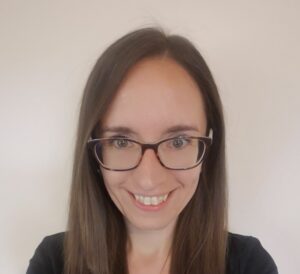Meet Mhairi Donnelly
Mhairi is a Consultant Hepatologist at the Freeman Hospital, Newcastle upon Tyne.
What attracted you to a career in gastroenterology/hepatology?
I first considered a career in gastroenterology when I undertook a CMT1 placement in the specialty in Aberdeen Royal Infirmary. The whole multidisciplinary team were passionate and enthusiastic about the specialty, which was less evident in other placements I had had as a junior doctor. The consultants were hugely supportive and encouraged me to get involved in projects and experiences beyond the day to day CMT1 job, and I knew I wanted to work with similar teams in the long term.
I was further attracted to a career in gastroenterology and hepatology by the day to day variety that working in the specialty offers, and the practical aspect of the job with endoscopy. I soon developed a specialist interest in hepatology, and was drawn by the challenge of managing hepatology inpatients, who are amongst the sickest patients in hospital.
Finally, gastroenterology/hepatology is a relatively new specialty, and I was drawn to the wealth of research and development within the specialty, and the clear opportunities to get involved even as a junior doctor.
What advancement in gastroenterology/hepatology are you most excited about and why?
The field of liver transplantation is rapidly evolving, with a number of new technologies being designed and utilised to increase the donor pool and optimise graft function, ultimately improving outcomes for patients. Over the next few years, there is also likely to be an expansion in the indications for liver transplantation. These developments will hopefully increase access to liver transplantation to a greater number of patients in need. The improvements in delivering palliative care in liver disease are also extremely important, and I am looking forward to seeing how this subspecialty area develops over the coming years, with the hope that this will make a real difference in improving the quality of life for hepatology patients who have a high medical and psychosocial symptom burden.
What do you enjoy most about your work?
Without a doubt, the aspect of my job that I enjoy and cherish the most is the day to day variety that working in gastroenterology and hepatology offers. For example, a single working day can include outpatient clinic reviews, emergency endoscopy, advising on the management of critically ill patients in intensive care, assessing and discussing patients referred for consideration of liver transplantation and research meetings.
I thoroughly enjoy the challenges of complex hepatology and looking after patients who are critically ill and often the sickest in the hospital. Managing these patients requires good multidisciplinary teamwork, and I enjoy working with and learning from other specialities and disciplines. Looking after gastroenterology and hepatology patients requires both the art and science of medicine, and I find this very satisfying.
What is the one thing you would change?
Improved integration of IT systems between primary and secondary care would hugely benefit patient care and safety, and time efficiency for busy clinicians.
What’s the best advice you’ve been given in your career?
The best advice I have been given has come from my senior colleagues whilst I was a trainee. When considering consultant jobs, I was consistently told about the importance of having good colleagues. As a new consultant, being able to discuss clinical cases and feeling comfortable to ask for advice regarding clinical and non-clinical issues from colleagues and team members and having their support is crucial.
‘Follow your heart’ – despite knowing I wanted to be a hepatologist (ideally working in a transplant centre) I had concerns about applying for the hepatology advanced training programme due to the implications I thought that this would have on other aspects of my training, including colonoscopy training. After a period of research, I also had very limited training time left to incorporate the hepatology subspecialty year. After discussions with an excellent education supervisor, I was encouraged to ‘follow my heart’ and focus on taking the opportunity that was likely to benefit me most in the long term. I applied for the hepatology post and stopped training in colonoscopy, allowing me to focus my training on hepatology and ultimately be able to apply for the job in a liver transplant centre that I wanted, and I am grateful for this advice that I was given.
What does being a BSG member mean to you?
I have been a BSG member since I was a trainee, and I have always felt part of a supportive, friendly and hard-working medical community. As a trainee, the BSG offered a supportive way of gaining experience in presenting work at annual meetings, and the trainee education meetings were (and continue to be) fantastic learning and networking opportunities.
Being a BSG member has also given me the opportunity to participate in collaborative projects that I wouldn’t otherwise have had the chance to, and to take on higher roles such as being a member of the liver section committee. Being a BSG member, I believe that you truly have the chance to shape to future of UK gastroenterology and hepatology.
Through the BSG I have also had the chance to integrate with other professionals working within gastroenterology; this networking ultimately improves patient care and I value this experience that the BSG has offered.
I look forward to continuing to be an active BSG member throughout my career, and to be involved in the positive changes in the specialty that a society such as the BSG can implement.
If you are interested in taking part in our Meet our Members initiative, please contact the BSG Communications team.
